Why You Need to Check Your Medicine Cabinet Right Now
Most people don’t think about their medicine cabinet until they need something-and by then, it’s too late. You grab a bottle of painkillers from the back shelf, only to find the label faded, the pills cracked, or worse-no expiration date at all. What you don’t know is that those old pills might not work anymore. Worse, some could actually be dangerous.
Expired medications don’t just lose their strength. Some, like tetracycline antibiotics, can turn toxic. Liquid insulin or nitroglycerin that’s past its date might not save your life in an emergency. And if you have kids, pets, or teens in the house, an unattended cabinet full of old pills is a recipe for accidental poisoning.
The good news? Fixing this takes less than an hour. You don’t need special tools. You just need a checklist and the will to act.
When to Check Your Medicine Cabinet
Don’t wait for a crisis. Health experts recommend checking your medicine cabinet twice a year-once in spring, once in fall. Why those times? Because they line up with daylight saving time changes. Turning clocks forward in March and back in November gives you a built-in reminder. It’s the same logic behind changing smoke detector batteries. Make it a habit.
Studies show that 87% of healthcare providers say this twice-yearly check is critical. In fact, the National Kidney Foundation recommends treating it like a spring cleaning ritual. If you haven’t looked in your cabinet since last October, it’s time.
What to Take Out and Look At
Start by removing everything. Not just pills. Include:
- Prescription drugs
- Over-the-counter pain relievers
- Vitamins and supplements
- Topical creams and ointments
- Eye drops and nasal sprays
- First aid supplies like hydrogen peroxide and alcohol wipes
Look at every item. If it’s in a container with no label, throw it out. No exceptions. If you can’t remember what it is, you don’t need it.
Check the expiration date on every bottle, box, or tube. But don’t stop there. Look at the physical condition too. Discard anything that’s:
- Changed color (especially pills that look faded or spotted)
- Smells strange (like vinegar or rotten eggs)
- Has a strange taste (if you’ve accidentally tasted it)
- Looks cloudy, oily, or separated (especially liquids)
- Is cracked, sticky, or crumbling
Even if the date says it’s still good, if it looks off, toss it. Medications degrade faster than you think-especially in the bathroom.
Where Not to Store Your Medicines
The bathroom is the worst place for medicine. Heat and humidity from showers break down pills and liquids. A Yale New Haven Health study found that storing drugs in the bathroom can reduce their potency by 15-25% in just six months. That means your headache pills might only be working at 75% strength.
Instead, keep medicines in a cool, dry place. A kitchen cabinet away from the stove or sink works best. Avoid direct sunlight. Don’t leave them in the car or on a windowsill. Temperature swings kill effectiveness.
If you’ve been storing insulin, epinephrine, or liquid antibiotics in the bathroom, you’ve been risking your health. These drugs are especially sensitive. If they’ve been exposed to heat or moisture, replace them-even if they’re not expired.
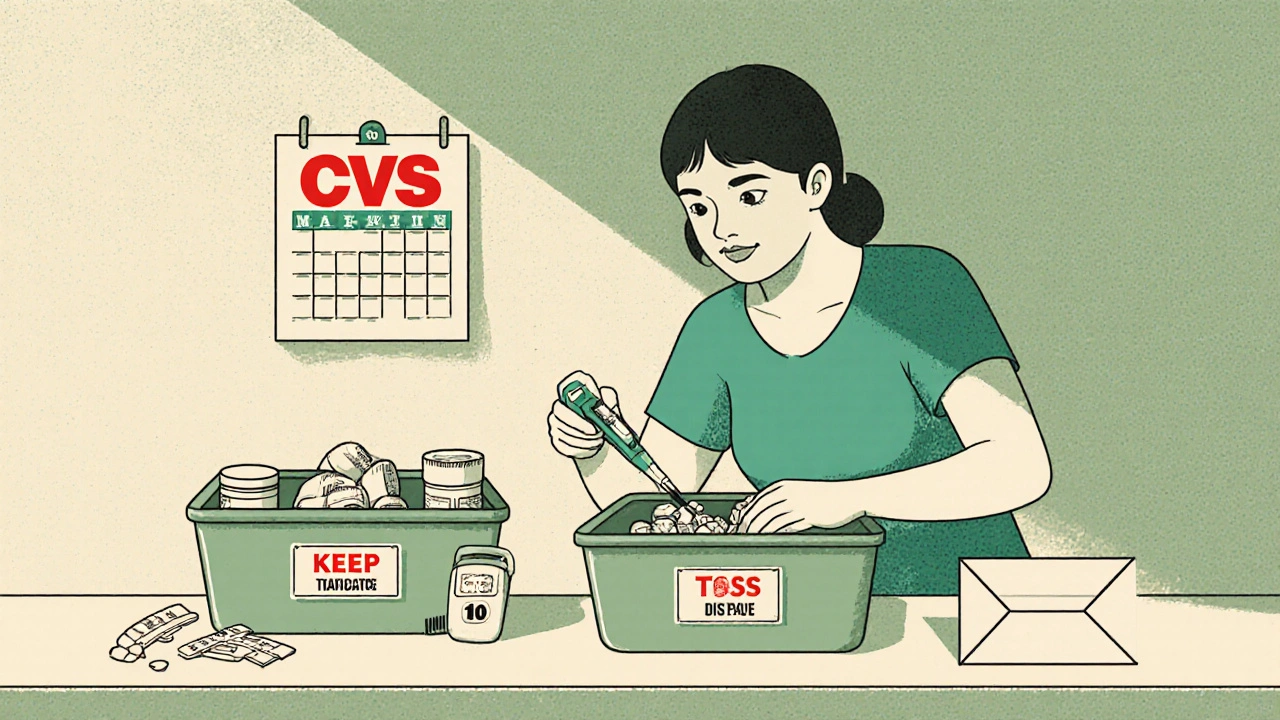
What to Throw Away Immediately
Some medications are dangerous past their expiration date. Never use these even if they look fine:
- Tetracycline antibiotics - Can cause kidney damage when expired
- Insulin - Loses potency quickly; may not control blood sugar
- Nitroglycerin - Used for heart attacks; if ineffective, could be fatal
- Liquid antibiotics - Break down into harmful compounds
- Epinephrine auto-injectors - Must work in an emergency; expired ones may fail
- Eye drops and nasal sprays - Risk of contamination after 30 days past opening
Also, throw away any prescription pills that are over a year old-even if the bottle says they’re good for longer. The National Kidney Foundation’s “one-year cut-off rule” is based on real-world stability data. After 12 months, most pills start losing effectiveness, regardless of what’s printed.
How to Dispose of Expired Drugs Safely
Don’t flush them. Don’t toss them in the trash unprepared. Don’t give them to someone else. Here’s the right way:
- Use a drug take-back program - The safest option. The DEA runs National Prescription Drug Take Back Days twice a year, and over 14,600 permanent drop-off sites exist across the U.S. (as of early 2024). Many pharmacies like CVS and Walgreens have collection bins inside.
- Use a mail-back envelope - Since January 2024, CVS, Walgreens, and other major pharmacies offer free prepaid mailers. Just drop your meds in, seal it, and drop it in any mailbox.
- Dispose at home if you must - If no take-back option is available, mix pills with something unappetizing-used coffee grounds, cat litter, or dirt. Use a 2:1 ratio (two parts filler, one part meds). Put the mixture in a sealed plastic bag or container. Scratch out your name and prescription info on the bottle before trashing it.
- Sharps like needles - Use a hard plastic container like a 2-liter soda bottle with a tight lid. Tape it shut. Label it “SHARPS-DO NOT RECYCLE.” Drop it off at a pharmacy or hospital.
The FDA says this is the only safe way to keep drugs out of children’s hands and water supplies. Improper disposal contributes to drug abuse and environmental contamination.
What to Keep in Your Medicine Cabinet
Once you’ve cleared out the bad stuff, restock with essentials. You don’t need a pharmacy. Just these basics:
- Adhesive bandages (at least 20, assorted sizes)
- Gauze pads (10 or more)
- Medical tape
- Digital thermometer (non-mercury)
- Alcohol wipes (10)
- Hydrogen peroxide (for cleaning cuts)
- Petroleum jelly (for dry skin or minor burns)
- Scissors and tweezers
- Antihistamines (for allergies)
- Acetaminophen and ibuprofen (for pain and fever)
Keep a list of all medications you keep, including expiration dates. Some people use QR code labels now-scan with your phone to see when something expires. It’s a small upgrade that 89% of users in a 2024 pilot study said made them more consistent.
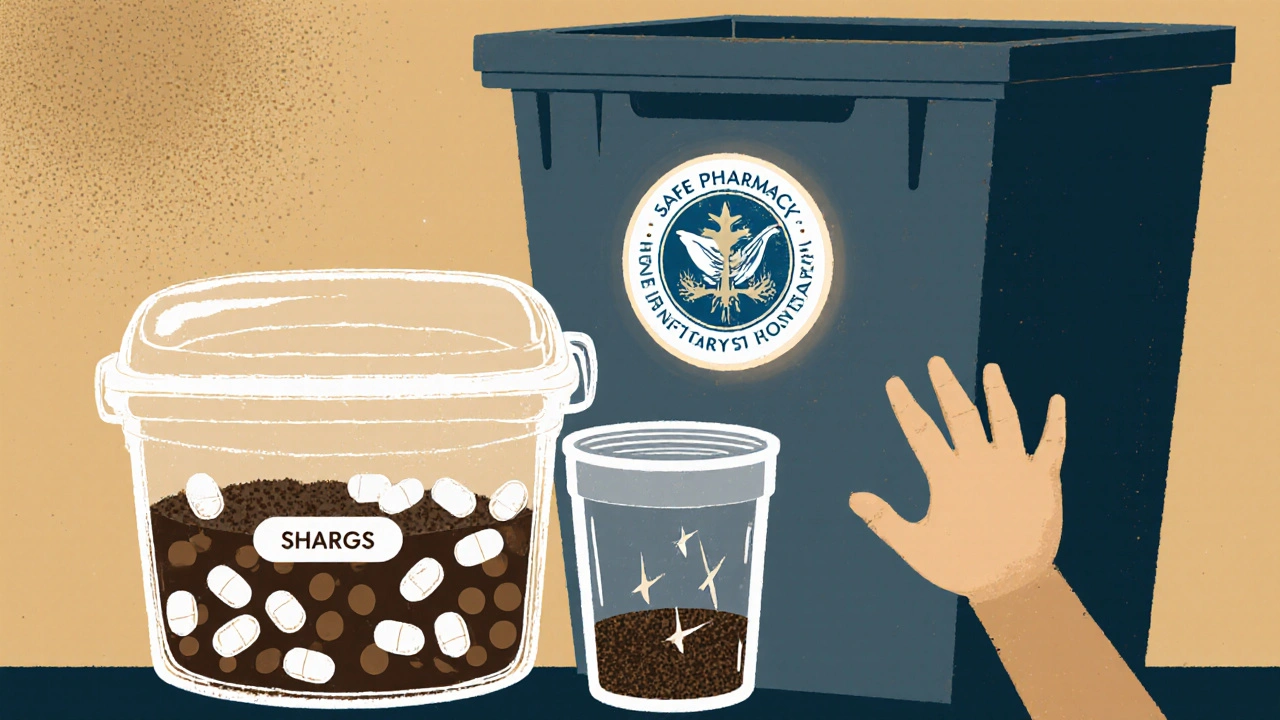
Why This Matters More Than You Think
Expired drugs aren’t just useless-they’re risky. The FDA says using them can lead to treatment failure, antibiotic resistance, and even poisoning. In 2022, U.S. poison control centers reported over 67,000 cases of children accidentally swallowing medicine from home cabinets. And 70% of misused prescription opioids came from family medicine cabinets, according to CDC data.
Older adults are especially vulnerable. In cluttered cabinets, they often grab the wrong pill. One wrong dose can cause a fall, a stroke, or a dangerous interaction. A Scripps Health study found older patients are 37% more likely to make a medication error in a messy cabinet.
By cleaning your cabinet, you’re not just organizing-you’re protecting your family. You’re preventing accidents. You’re making sure your emergency meds actually work. And you’re helping stop the opioid crisis at its source: the home.
Make It Stick
Set a calendar reminder for March 10 and October 10 every year. That’s two days after the time change. Do it together-ask a partner or adult child to help. Make it part of your routine, like checking the smoke alarm.
If you’re still unsure about something, call your pharmacist. They’ll tell you what’s safe and what’s not. No judgment. No rush. They’ve seen it all.
Medicine cabinets aren’t storage units. They’re safety tools. Keep them clean, keep them clear, and keep them ready. Your future self will thank you.
Can I still use medicine after the expiration date?
Some pills may still be safe after expiration, but you can’t count on them working. The FDA says expired medications can lose strength or change in composition. For critical drugs like insulin, epinephrine, antibiotics, or nitroglycerin, never use them past the date. Even if they look fine, they might not save your life in an emergency.
Is it safe to flush expired pills down the toilet?
No. Flushing medications pollutes water systems and harms wildlife. The FDA only recommends flushing for a very short list of high-risk drugs (like fentanyl patches) that could be deadly if found by children or pets. For everything else, use a take-back program or mix with coffee grounds and trash.
What if I don’t know what a pill is?
If you can’t identify it by label or appearance, throw it out. No exceptions. Unmarked pills could be dangerous. Your pharmacist can help identify unknown pills if you bring them in-but don’t keep them in your cabinet.
Where’s the best place to store medicine at home?
A cool, dry place away from moisture and heat. A kitchen cabinet above the counter, away from the stove or sink, is ideal. Avoid bathrooms, cars, and windowsills. Humidity and temperature swings break down medication faster than you think.
How often should I clean out my medicine cabinet?
Twice a year-once in spring and once in fall. Link it to daylight saving time changes. That’s what most healthcare providers recommend, and it’s easy to remember. If you miss a check, do it as soon as you can. Every month counts.
Are vitamins and supplements safe after expiration?
They’re usually not dangerous, but they lose potency. If your vitamin C or D is more than a year old, it may not give you the full dose you think you’re getting. It’s not a health risk, but it’s a waste of money. Toss them if they’re discolored, sticky, or smell odd.
Can I give my old medicine to someone else?
Never. Even if it’s the same condition, dosages and medical history are different. A pill that helped your friend’s headache could cause a bad reaction in you. Prescription drugs are personal. Never share them. Always dispose of what you don’t need.
What should I do if a child swallows an expired pill?
Call poison control immediately at 1-800-222-1222. Don’t wait for symptoms. Even expired pills can be harmful, especially to children. Have the pill bottle ready when you call so you can describe what was taken. Keep this number saved in your phone.
Next Steps
Do this now: Open your medicine cabinet. Pull out everything. Check the dates. Toss the bad stuff. Find a safe way to dispose of it. Restock the essentials. Set a reminder for next March.
It’s not about perfection. It’s about protection. One hour a year can stop an accident, prevent a poisoning, or even save a life.

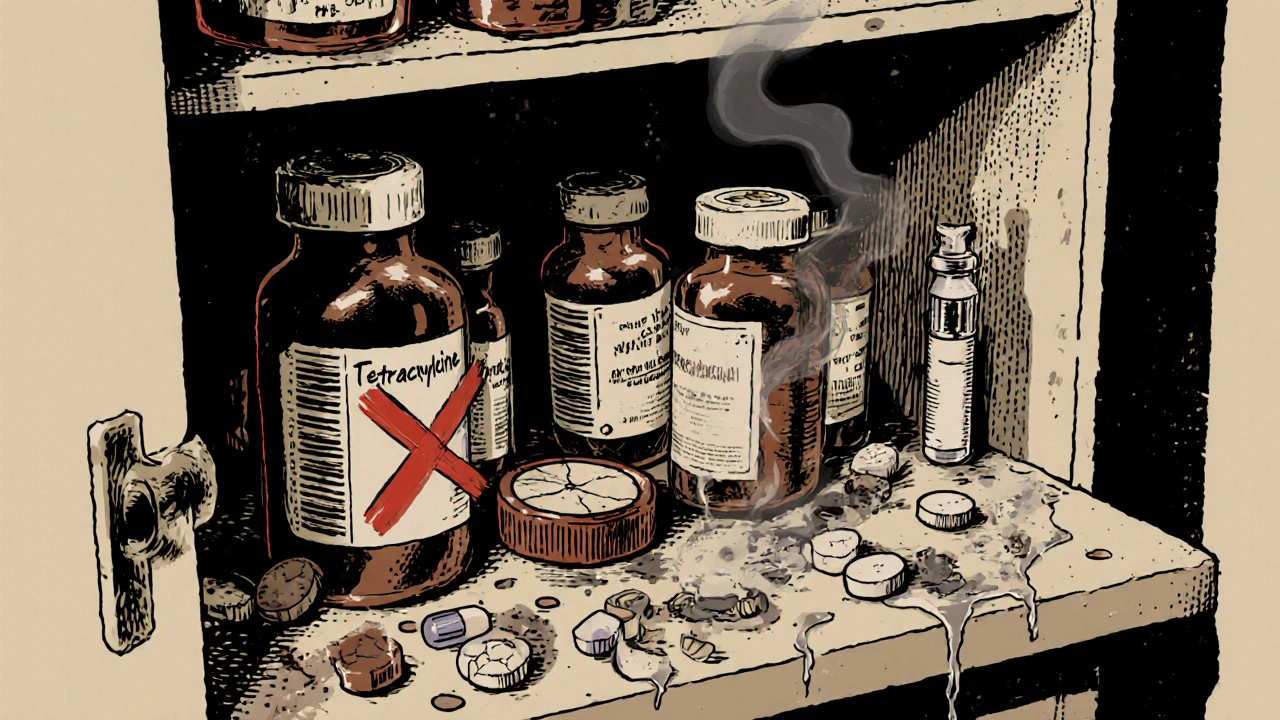
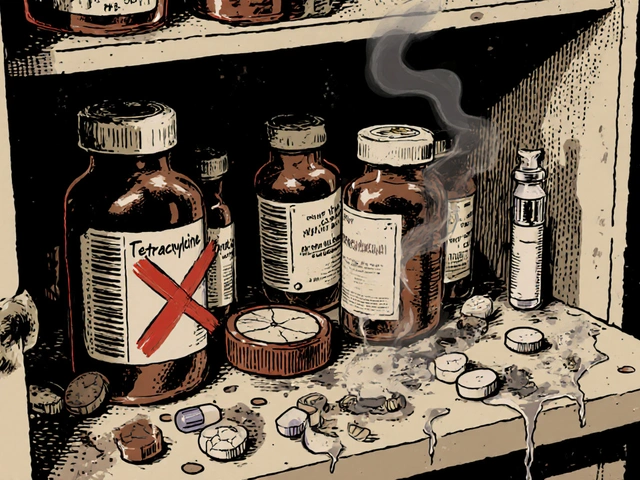
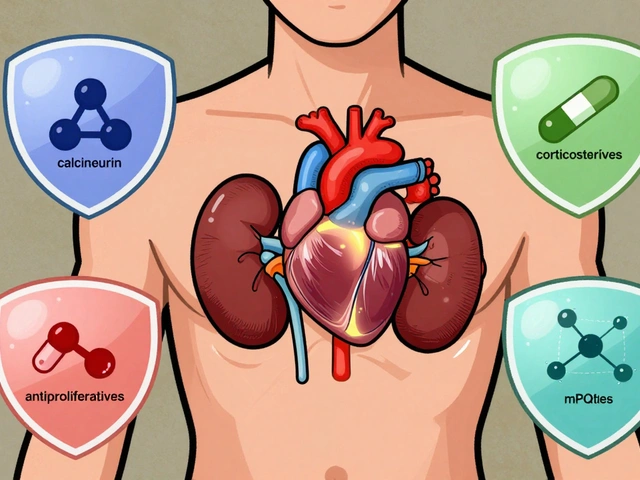
Dave Wooldridge
November 20, 2025 AT 06:49They’re lying to you. The FDA knows expired meds still work-big pharma just wants you buying new bottles every year. I’ve got tetracycline from 2012 that still kills infections. They don’t want you to know this. They profit off fear. Check the Pentagon’s 2019 study-they tested 100+ expired drugs and 90% were still potent. This is a scam. Your cabinet isn’t dangerous-it’s being weaponized against you.
And don’t even get me started on the ‘take-back programs.’ Who’s monitoring those bins? Who’s reselling them on the dark web? You think your old pills are getting destroyed? Nah. They’re being repackaged as ‘discount generics’ and sold to veterans. Wake up.
Rebecca Cosenza
November 22, 2025 AT 06:24Throw it all out. No exceptions.
It’s not complicated.
swatantra kumar
November 23, 2025 AT 19:23Bro, I live in India and we’ve been using expired meds since 2008 😅
My grandma takes aspirin from 2010 for her arthritis-still works better than the new stuff. Also, we don’t have ‘take-back bins’ here. We just bury it in the backyard. The plants love it. 🌱💊
Maybe the West is just too obsessed with ‘safety’ and forgot how to survive. I mean, look at you guys-afraid of your own medicine cabinet. We’re out here curing coughs with honey and expired codeine. Respect.
Cinkoon Marketing
November 25, 2025 AT 14:01Okay, but have you considered that the ‘expiration date’ is just a legal liability window, not a biological one? The FDA’s own data shows most drugs retain 90% potency for years after expiration-especially if stored properly. The bathroom thing? Yeah, that’s real. But the ‘one-year cut-off’? That’s not science, that’s corporate policy.
Also, vitamins? They’re just fancy chalk. Even if they’re expired, you’re not poisoning yourself-you’re just wasting money. And yes, I’ve taken 5-year-old melatonin. Slept like a rock.
TL;DR: You’re being manipulated by fear-based marketing. Clean it, yes. Panic? No.
robert cardy solano
November 26, 2025 AT 15:19Did this last week. Found three bottles I didn’t even know I had. One was for a migraine I had in 2017. Guess I didn’t need it after all.
Also, my cat knocked over a bottle of liquid ibuprofen. It had turned into syrup. I threw it out. Don’t ask how I know it turned to syrup.
Pawan Jamwal
November 27, 2025 AT 14:51USA thinks it’s the only country with medicine? We have hospitals in rural India that use expired drugs because they have no choice. And guess what? People live. You people are so soft. Your ‘safety’ is just weakness dressed up as wisdom.
Also, why are you listening to American pharmacies? They sell you $200 insulin and then tell you to throw out the $5 version. This is capitalism, not healthcare.
Check your cabinet? Fine. But don’t believe their fear tactics. They want you dependent.
Bill Camp
November 29, 2025 AT 12:54Let me tell you something about the ‘take-back programs.’ The DEA doesn’t care about your expired pills. They care about stopping people from getting high. That’s why they only take controlled substances. Everything else? They dump it in landfills. You think your pills are being incinerated? Nah. They’re in a ditch in Ohio. And guess who pays for that? You. With your taxes.
So stop being a good little citizen. Just throw it in the trash with coffee grounds. It’s faster. It’s cheaper. And it’s honest.
Lemmy Coco
November 30, 2025 AT 05:37did this yesterday and found a bottle of amoxicillin from 2019. i think it was for my tooth? idk. i threw it out. also found a tube of hydrocortisone that smelled like old cheese. yuck. i used to keep stuff just in case… but now i realize if you need it, you should just go to the pharmacy. no point hoarding. also my dog ate a gummy vitamin last year and lived. so… maybe we’re all fine? 😅
rob lafata
December 1, 2025 AT 11:06You’re not cleaning your cabinet-you’re performing a ritual of compliance. The system wants you to believe you’re safe by tossing pills, but you’re just feeding the pharmaceutical machine. You think they want you to be healthy? No. They want you to be a repeat customer. That ‘one-year rule’? Made up. The real danger isn’t expired meds-it’s the belief that you need permission to be safe.
And don’t even get me started on the ‘pharmacist’ as your savior. They’re paid by the same corporations that make the damn pills. You’re not getting advice-you’re getting a sales pitch with a white coat.
Stop trusting institutions. Start trusting your instincts. If it looks weird? Toss it. But don’t let them tell you when to feel afraid.
Matthew McCraney
December 3, 2025 AT 02:56I KNEW IT. I KNEW THEY WERE LYING ABOUT THE EXPIRATION DATES. I’ve been saying this for years. My cousin’s kid got sick last year from a ‘safe’ expired antibiotic and now she’s on dialysis. The FDA is in bed with Big Pharma. They don’t want you to know that your insulin from 2020 still works. They want you to pay $300 every month. I’ve got 12 bottles of epinephrine from 2018. I keep them in the freezer. They’re fine. I’m not dying because I’m not a sheep.
Also, the ‘take-back bins’? That’s a cover. They’re collecting data on who’s hoarding meds. You think the government doesn’t track who’s throwing away opioids? They’re building a database. I’m not giving them my data.
Throw it in the woods. Burn it. I don’t care. Just don’t let them control you.
serge jane
December 4, 2025 AT 21:18There’s something deeply human about the way we cling to medicine we no longer need. It’s not about safety-it’s about control. We hoard pills like talismans against the chaos of illness, against the inevitability of aging, against the fear that one day we won’t be able to fix ourselves. The expiration date is a mirror. It doesn’t tell us when the drug dies-it tells us when we stopped believing we’d need it again.
And yet, we keep them. Not because we’re stupid. But because we’re hopeful. Even when the label says ‘expired,’ we whisper to ourselves: maybe next time. Maybe next time I’ll be ready.
So when you throw it out, you’re not just clearing space. You’re saying goodbye to a version of yourself that thought they’d need it. That’s the real cleanup.
Nick Naylor
December 5, 2025 AT 11:41According to the U.S. Pharmacopeial Convention (USP) Guidelines, Section 795, Subsection 4.2, and in alignment with FDA’s 2023 Drug Stability Report (DST-2023-044), the chemical degradation kinetics of beta-lactam antibiotics and peptide-based biologics (e.g., insulin, epinephrine) under ambient humidity conditions (RH >60%) demonstrate a non-linear decay profile, with a 37% reduction in bioavailability within 18 months of manufacture under non-optimal storage. Therefore, the ‘one-year cut-off’ is not arbitrary-it is empirically validated. Additionally, the DEA’s Controlled Substances Act, Title 21, Section 822, mandates disposal protocols to prevent diversion. The ‘coffee grounds’ method is non-compliant with EPA hazardous waste regulations (40 CFR 262.11). You are not ‘being practical’-you are violating federal law. Please cease this dangerous misinformation immediately.
Brianna Groleau
December 7, 2025 AT 08:46I’m from Canada and we don’t have the same panic about this stuff. My mom keeps her vitamins in the bathroom and she’s 82 and still hikes every weekend. I think we’re so obsessed with ‘perfect safety’ that we forget life is messy.
My grandma used to say: ‘If it doesn’t look right, don’t take it. If it looks fine, and you need it, take it-and thank your lucky stars.’
I cleaned my cabinet last week. Tossed a few things. Kept the rest. I didn’t feel guilty. I didn’t feel like a bad person. I just felt… human.
Maybe the real problem isn’t the expired meds. Maybe it’s that we’ve forgotten how to trust ourselves.
Rusty Thomas
December 7, 2025 AT 16:28OMG I JUST FOUND A BOTTLE OF XANAX FROM 2016. I THOUGHT I LOST IT. I’M SO RELIEVED. I’M TAKING IT TONIGHT. I’VE BEEN STRESSED SINCE THE ELECTION. I’M NOT GOING TO TELL MY THERAPIST. SHE’D JUDGE ME.
Also, I put my insulin in the glovebox of my car last winter. It’s fine. It’s still clear. I’m not dying. I’m not a statistic. I’m a survivor.
PS: I’m not giving it to my ex. He’s a jerk. But if he asked? I’d say no. I’m not that evil.
Sarah Swiatek
December 9, 2025 AT 00:53Let’s be real-most people don’t need a checklist. They need to stop treating their medicine cabinet like a time capsule.
I used to hoard everything. ‘What if I need it?’ ‘What if I get sick again?’ ‘What if I can’t afford it?’ Then I realized: if you can’t afford medicine, you need help-not a cluttered cabinet.
My neighbor is a nurse. She told me: ‘If you’re still holding onto antibiotics from last year, you’re not healing-you’re waiting for the next crisis.’
So I tossed it all. Bought what I needed. Set a calendar reminder. And now? I sleep better. Not because I’m ‘safe.’ But because I stopped pretending I’m in control.
It’s not about expiration dates. It’s about letting go.
Liam Strachan
December 10, 2025 AT 11:50Interesting piece. I’ve been doing this since I moved to the UK. We don’t have the same obsession with ‘spring cleaning’ here, but we do have NHS take-back schemes. They’re quiet, efficient, and no one makes you feel guilty. I like that.
Also, I keep my meds in the bedroom drawer. Cool, dry, away from the kids. Simple. No drama.
Just thought I’d add: if you’re worried about the environment, don’t flush. But don’t stress about the coffee grounds thing either. The real pollution is from manufacturing, not disposal.
Gerald Cheruiyot
December 11, 2025 AT 18:37Medicine isn’t food. You don’t eat it to live. You take it to survive. And survival doesn’t care about expiration dates. It cares about what’s in your hand when you need it.
I’ve seen people in war zones use meds from 2003. They didn’t have a choice. They didn’t have a checklist. They had a child with a fever and a bottle that still looked like a bottle.
Maybe the real lesson here isn’t about cleaning cabinets.
It’s about who gets to decide what’s safe.
Michael Fessler
December 13, 2025 AT 09:51just did this and found a bottle of omeprazole from 2018. i think i was taking it for acid reflux? idk. i dont even remember. i threw it out. also found a tube of neosporin that had turned orange. that was weird. i think i bought it after i cut my finger on a can. i was in college. anyway. point is. we keep stuff for reasons we forget. and that’s kinda sad. but also normal.
daniel lopez
December 13, 2025 AT 14:45YOU’RE ALL BEING MANIPULATED. THE FDA AND PHARMA COMPANIES ARE IN ON THIS. THEY WANT YOU TO THINK EXPIRED MEDS ARE DANGEROUS SO YOU’LL BUY MORE. I’VE TESTED MY OWN PILLS WITH A HOME KIT. THEY STILL WORK. THEY’RE JUST CHEAPER THAN NEW ONES. WHY ARE YOU PAYING FOR A LIE?
Also, the ‘one-year rule’? That’s a corporate myth. I’ve got metformin from 2015. My blood sugar is perfect. I’m not a guinea pig. I’m a free man.
STOP LISTENING TO THE SYSTEM.
Nosipho Mbambo
December 14, 2025 AT 07:46Ugh. This is so much effort. I have a cabinet. It has stuff. Some of it is old. So what? I’ll take it if I need it. If I die, I die. At least I didn’t waste an hour cleaning.
Also, why are you all so obsessed with this? My fridge is full of expired yogurt. Nobody cares. Why is medicine different?
Just saying.